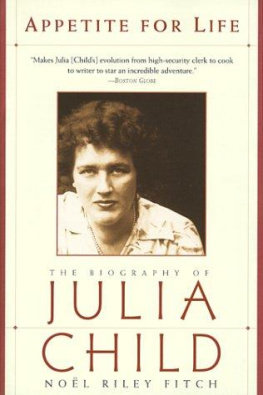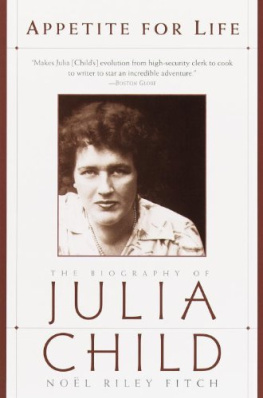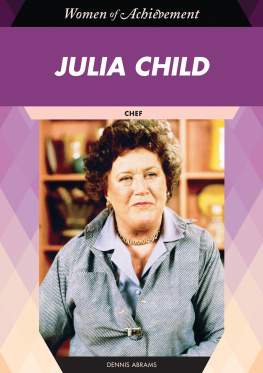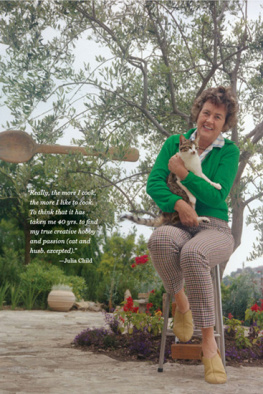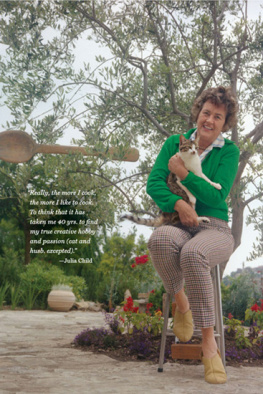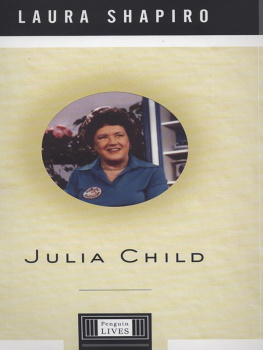by the same author Sylvia Beach and the Lost Generation:
A History of Literary Paris in the Twenties and Thirties Hemingway in Paris Literary Cafs of Paris Anas: The Erotic Life of Anas Nin


For my sisters
Lynn and Gail
and
for my husband
Albert Sonnenfeld
with whom I share the joys of the table

I too am an Epicurean.
THOMAS JEFFERSON

C ONTENTS
1 
2 
3 
4 
5 
6 
7 
8 
9 
10 
11 
12 
13 
14 
15 
16 
17 
18 
19 
20 
21 
22 
23 
24 
25 
26 
27 

Chapter 1
B EGINNINGS
(1945, 1848 1912)
How like autumns warmth is Julias face
PAUL CHILD, August 15, 1945

P ERCHED ON THE railing of a veranda in Kunming, China, Julia McWilliams was aware only of the uniformed man beside her, reading the poem he wrote for her thirty-third birthday. She stretched her very long legs out in front of her, crossing them at her ankles, so Paul Child could see what he would later call my beloved Julias magnificent gams. She barely noticed the formal gardens beyond the porch or the miles of rice paddies stretching toward Kunming Lake. Nor did her gaze settle on the mist-shrouded Shangri-La of temples carved into the rock of West Mountain. It was his voice that captured her, each word he read a note weaving a melody through her heart: The summers heat of your embrace melts my frozen earth.
The cotton dress clung to her slim, six-feet-two-inch body. Here she was in China, a privileged girl, seeking adventure, even danger, in the civilian opportunities of World War II, and she had found it, not in the Registry of the Office of Strategic Services, nor in the backwoods refugee city of Kunming at the end of the Burma Road, but in the urbane, sophisticated, multilingual presence of forty-three-year-old Paul Child. They talked all evening, his intellect challenging her, his experienced touch awakening her. In the last China outpost of Lord Mountbattens command, surrounded at sea by Japanese forces, warplanes droning in the distance, Julia McWilliams felt alive.
How like autumns warmth is Julias face,
So filled with natures bounty, natures world.
The cadence of his voice, reciting his sonnet To Julia, intensified the air of anticipation between them, dimming for the first time the news they had received that week of the dropping of the atomic bomb on Hiroshima and Nagasaki. Russia was invading Manchuria to the north. Just hours earlier they had heard of Japans surrender and knew the world was changing for everyone, not just themselves.
I cast this heaped abundance at your feet:
An offering to summer and her heat.

P AUL DROVE Julia by jeep to a mountain retreat for a weekend, where they talked of meeting each others families: he had a twin brother, whose family lived in Pennsylvania, she two siblings and a father in California. The differences in their height (he was a mere five feet ten and three-quarters inches), age, education, cultural and political backgrounds, and values seemed less severe in this foreign territory where the future was so uncertain. He called theirs a sweet friendship in his sonnet, but she wanted much more from this wartime embrace in a strange land. When he read aloud the awakening fields abound / With newly green effulgence, he could have been talking about her.
They had met just the year before in a tea planters veranda in Ceylon, when he was courting several women and seemed far beyond her reach in knowledge and experience. He had the worldly-wise caution of a man who had supported himself since he was a child, sailing the high seas, working at physically demanding jobs, and educating himself in the classics, art, and music. Despite her degree from Smith College, the gangly girl from the West seemed to have little in common with this cosmopolitan ladies man. I was a hungry hayseed from California, she would declare half a century later:
There were a lot of women around and he was ten years older than I. Very sophisticated. He had lived in France and Id only been to Tijuana! So I found him very impressive, you see. And he was also an intellectual. I was a kind of Southern California butterfly, a golf player and tennis person who acted in Junior League plays.
She was indeed a party girl, a child of well-to-do parents, who had never had to work. Though she occasionally held jobs in New York City and Los Angeles, marriage was the usual goal of her generation. Had the war not come, she said, she might have become an alcoholic amid the society life of Pasadena. Julia stood out in any crowd, not just because of her height, but because she was strikingly beautiful in a wholesome way. She was also like a magnum of champagne, the effusive life of the party, even, as far as Paul was concerned, occasionally hysterical. But as he learned more of this woman, he saw the depth of her character, and her joy lifted him from his isolation and reserve. Thirty-five years after their wedding, he told a Boston newspaper, Without Julia, I think Id be a sour old bastard living off in a cave.

